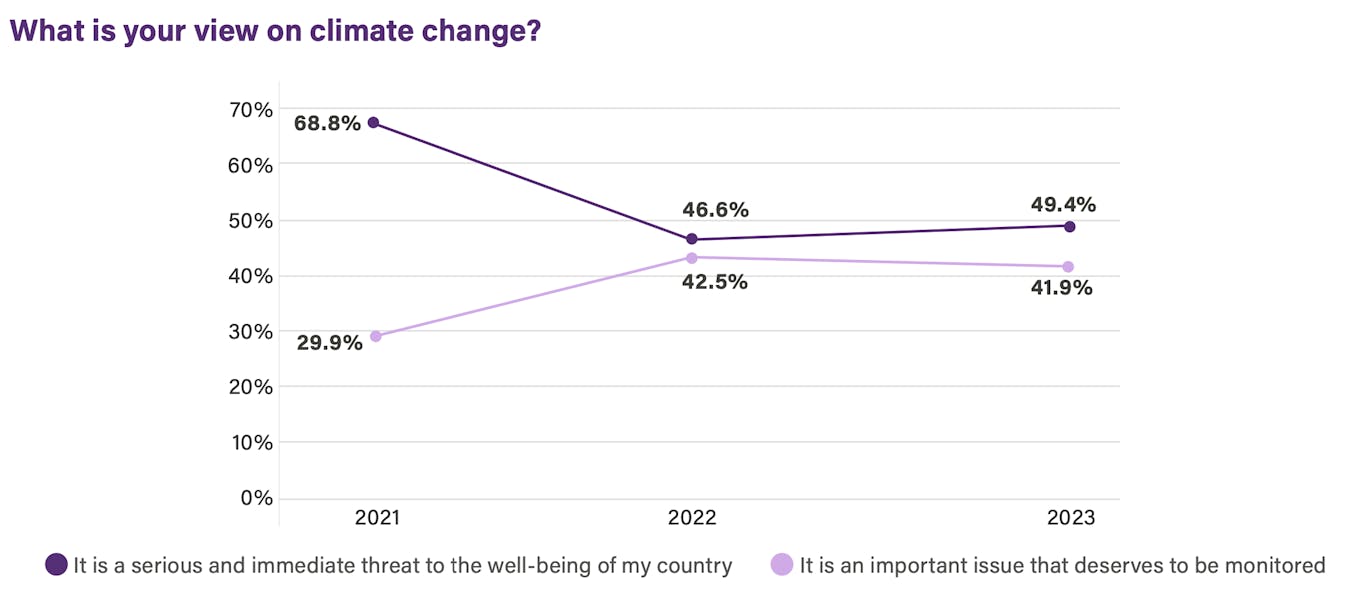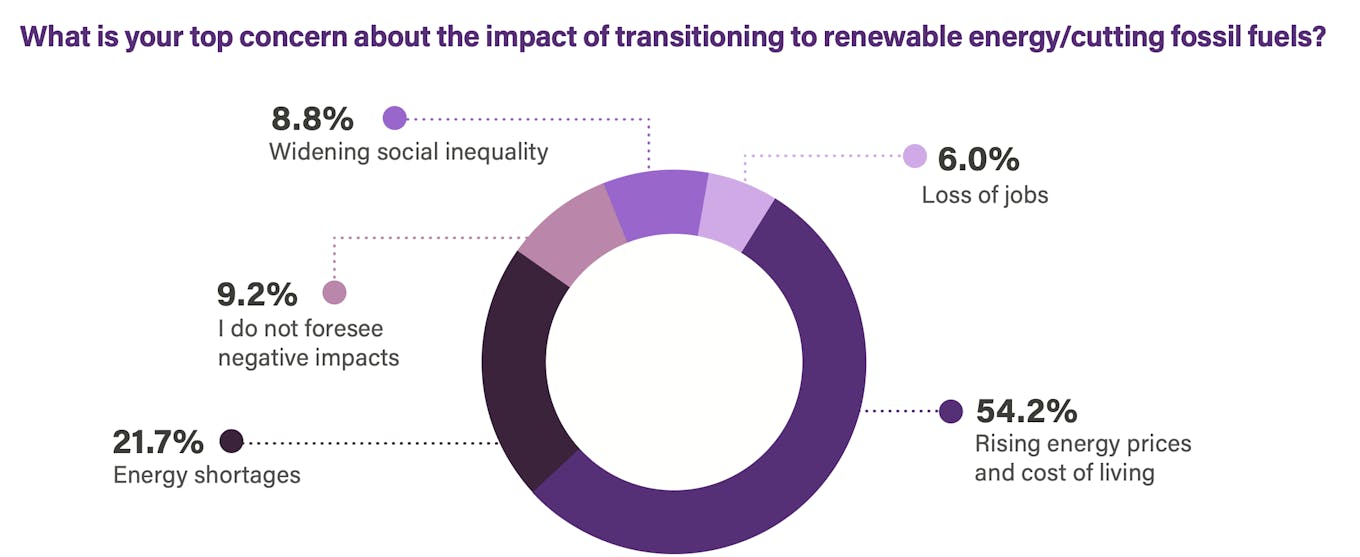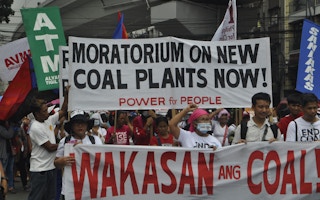At least half of Southeast Asians now want a slash in fossil fuel subsidies in their own countries and there is stronger support for coal production to be phased out immediately, a survey report shows.
The new data from the annual survey could reflect shifting perceptions towards direct interventions to accelerate the green transition in the region, even as respondents worry that such climate solutions could bring about higher energy prices.
In last year’s survey results, removing subsidies for dirty fuels was the least popular measure among respondents who were asked what governments can do to reduce carbon emissions domestically. Only 6.7 per cent of respondents opted for such a move.
The Southeast Asia Climate Outlook Survey, conducted by Singapore-based research centre ISEAS–Yusof Ishak Institute, also found that, one year on, nearly 70 per cent of respondents say they support a national carbon tax, with those from Vietnam, Indonesia and Philippines giving the strongest backing. Carbon pricing policies was the second least popular intervention (12 per cent) in the 2022 survey.
Respondents then had prioritised encouraging businesses to adopt green practices (33.8 per cent) and allocating more public financial support to low-carbon solutions (28.8 per cent).
Climate experts and researchers speaking at the report’s launch noted that a long-term predictable carbon pricing policy is beneficial for the region, but Southeast Asians might not have full awareness of the potential short-term pain they need to endure when they indicate that they will back carbon taxes, hence some of the conflicting responses.
Sharon Seah, senior fellow and coordinator of the institute’s climate change programme, said: “The dots haven’t really been connected for people… Countries in the region, however, do need to start looking at what they can do to remove market distortions that come in the form of (fossil fuel) subsidies and maybe even reform their electricity market. Ultimately, if all of these work, for the long haul, there can actually be greater energy security.”
Decades-long deals in Southeast Asia that keep coal plants active are complicating the region’s clean energy transition. As much as 15 per cent of the global coal pipeline is located in Asean, noted the report, and new research still highlights how the region could lead on coal expansion in the future – which is bad news for climate action.
“
The survey is a sign that governments, the media and academia must work more to communicate the urgent need for climate action. Yes, the facts and science ‘don’t care about our feelings’, but public buy-in is still important.
Nik Nazmi Nik Ahmad, minister of natural resources, environment and climate change, Malaysia
Researchers noted that socioeconomic considerations could have shaped perceptions towards subsidies. “Those with more purchasing power are more open to cutting subsidies,” they said in the report. About 31.8 per cent of the respondents said they were unsure about fossil fuel subsidy cuts, and the report recommended greater public engagement to help citizens make more informed decisions.
‘Bread and butter’ issues dominate
Researchers said the “most surprising finding” of this year’s survey is that even though Southeast Asians experienced major floods, heatwaves and droughts this year and recognised climate change as the predominant cause, there is a marked decline in the perception of threat urgency. Almost half (49 per cent) of respondents perceived climate change as a “serious and immediate threat” to their wellbeing, compared to 69 per cent in 2021.

The proportion of respondents expressing the highest level of urgency on climate has come down from 68.6 per cent in 2021 to 49.4 per cent in 2023. Source: Southeast Asia Climate Outlook 2023 Survey Report
Respondents who are “relatively more sanguine” about the impacts of climate change are led by those in Myanmar (56.8 per cent) who are “currently preoccupied” with civil war. This is followed by Malaysia which has also been undergoing major political upheaval over the last year, the report said.
When asked what they are most worried about as Asean countries try to push ahead with the renewables transition, the top concern cited was rising energy prices and cost of living, by about 54.2 per cent of respondents. About a fifth (21.7 per cent) of respondents highlighted energy shortages. Unemployment (6 per cent) and widening social inequality (8.8 per cent) were least on people’s minds, reflecting how narratives around climate justice might not have caught on in the region.
“While international organisations and academics have argued that the energy transition can widen inequality and lead to redundancies in some industries, these issues were not seen as major concerns by regional respondents,” said the report.

Asean respondents are less concerned about widening social inequality and loss of jobs. Source: Southeast Asia Climate Outlook 2023 Survey Report
Southeast Asians displayed stronger support for a coal phase-out, with 34.9 per cent of respondents saying this needs to be done immediately, compared to 30.7 per cent indicating so in 2022. The report cited how these sentiments are reflected in the latest government policies. For example, the Philippines has announced a moratorium on new coal plants.
There are mixed views on whether natural gas should be seen as a transition fuel. Most respondents (45.8 per cent) say that while natural gas is a temporary replacement for coal, countries must strive towards developing renewable energy generation. A substantial portion of respondents (18.2 per cent) believe that natural gas is an ideal replacement for coal, while 15.6 per cent of respondents say gas should be used alongside coal.
Spotlight on Indonesia’s climate leadership
The climate outlook survey, in its fourth edition, also asks Southeast Asians which country has the potential to be the region’s climate leader. While Singapore came out top again this year, with 38.7 per cent of respondents supporting its leadership, speakers at the survey launch said Indonesia, one of the world’s top 10 greenhouse gas (GHG) emitters, needs to step up more.
Singapore climate scientist Winston Chow, who was recently elected to the United Nations’ top climate body to co-lead a working group on climate impacts and adaptation measures, said: “The country in the region which contributes to the highest amount of GHG emissions should be the leader.”
Jessica Cheam, founder and managing director of Eco-Business, said she was surprised fewer people cited the lack of political will as the biggest obstacle to decarbonisation. According to the survey, more Southeast Asians viewed the lack of research and development, technology and expertise as the main barrier, which Cheam said differs from current conversations taking place among global and regional circles, including at the meetings and business forums she attends.
“The technology needed for us to drive decarbonisation already exists today, and most are saying that it is execution and deployment that is lacking, and political will is what you need to provide the right legislative frameworks and financing that is needed for the technological transfer,” she said. “Everywhere I go, the business community and investors are getting impatient. They are saying there is no time for talk and that we need action from governments.”
Malaysia’s environment and climate change minister Nik Nazmi Nik Ahmad, who delivered a pre-recorded keynote message for the survey launch, said that polls are “snapshots in time”, even though the results perhaps reflect how bread and butter issues have been pushed to the fore across Southeast Asia, amid post-pandemic recovery.
“The survey is also a sign that governments, the media and academia must work more to communicate the urgent need for climate action,” he said. “Yes, the facts and science don’t care about our feelings, but public buy-in is still important, even for noble, necessary national and international missions.”
“When it comes to fighting climate change, I’ve always felt that the way to win support is to ensure climate action is just, inclusive and not merely a top-down preoccupation,” he said.








